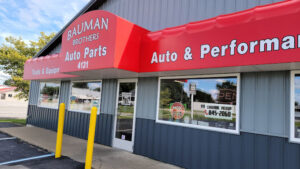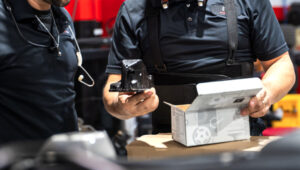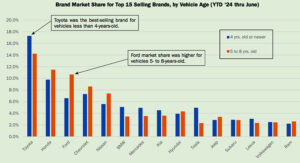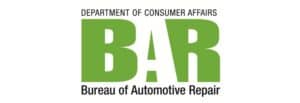The year began with more than 2,600 new bills which have started making their way through the legislative process — here’s where ones affecting auto repair presently stand
Sacramento, Calif.—The State Legislature began the year with more than 2,600 new bills, which have started making their way through the legislative process, and as the session moves forward, the California Autobody Association (CAA) is monitoring the bills, including amendments, and will add to the list. Here’s the CAA’s breakdown of where bills presently stand.
Bureau of Automotive Repair
AB 1263 — Bureau of Automotive Repair — Work with Committee on amendments. This bill extends sunset date of BAR and makes other changes raised during BAR sunset review oversight hearing. Status: Assembly.
Catalytic Converter Theft Bills
• AB 641 — Catalytic Converters — Watch. Makes it a misdemeanor for someone to possess 6 or more used catalytic converters that have been cut from a vehicle unless they are a licensed dismantler. Status: Assembly
• AB 1519 — Catalytic Converters — Concerns. Makes it a misdemeanor to remove alter or obfuscate any VIN engraved, etched or otherwise marked on a catalytic converter, or from possessing a catalytic converter that has been so altered. Status: Assembly
• SB 55 — Watch. Prohibits a motor vehicle dealer from selling a vehicle equipped with a catalytic converter unless the converter has been permanently marked with the VIN, the vehicle is sold for dismantling or salvage, the vehicle is sold at a wholesale auction or a buyer declines the marking offered by the dealer. Status: Senate.
Career Technical Educational
• AB 377 — Career Tech Education — Support. Increases Career Technical Education funding from $300 million each year to $450 million. Status: Assembly.
• AB 1189 — Career Technical Education — Watch. Requires each school district maintaining grades 7-12, to offer Career Technical Education to all pupils in those grades. Status. Two-year bill.
• AB 1346 — States the intent to enact legislation relating to Career Education and Career Guidance. Watch. Status: Two-year bill.
Employment
• AB 518 — Paid Family leave — Watch. Expands the definition of “family member” for purposes of the Paid Family Leave Program to allow workers to take time off to care for a seriously ill designated person. Status: Assembly.
• AB 524 — Family Caregiver — Concerns. Adds caregiver status as a protected class under Fair Employment and Housing Act. Status: Assembly.
• AB 1100 — Employment Workweek — Concerns. Establishes the 32-hour workweek pilot program. Status: Two-year bill.
• SB 616 — Paid Sick Days — Concerns. Modifies employer sick leave and requires an employee have no less than 56 hours of accrued sick leave. Status: Assembly.
• SB 703 — Support. Permits a nonexempt employee to request a flexible work schedule providing up to 10 hours per day within a 40-hour workweek without obligation to pay overtime. Status: Failed passage in committee.
Hazardous Waste
• AB 407 — Used Oil — Watch. Deletes the criterion that used oil not be subject to regulation as used oil under federal law. Status: Senate.
• AB 493 — Relates to the California Oil Recycling Enhancement Act. Watch. Status: Two-year bill.
• AB 1614 — Gas Fueling Stations — Watch. Requires State Water Resources to conduct a study on how to phase out the existence of gas fueling stations. Status: Assembly.
• AB 1716 — Hazardous Waste Management — Watch. Makes various technical changes to the six unified hazardous waste and materials management regulatory program that are overseen by the Certified United Programs Agencies (CUPAs). Status: Assembly.
Vehicle Batteries
• AB 1579 — Vehicle Batteries — Watch. Requires the state, beginning in 2035, to establish a bid specification for the acquisition of motor vehicles and determining the lowest bidder to consider whether the vehicle is equipped with lithium-ion batteries produced with the least environmental impact. Status: Assembly.
• SB 615 — Electric Batteries — Concerns. Requires an automotive repair dealer that removes a battery from a vehicle that is still in service to participate in a core exchange program established by the battery supplier and be responsible for either returning a removed battery to the battery supplier or sending it to a qualified facility. Status. Senate.
Zero Emissions Aftermarket
• SB 301 — Zero-Emission Aftermarket — Watch. Requires CARB to establish the Zero Emissions Aftermarket project to provide an applicant with a rebate for a vehicle that has been converted to a zero-emission vehicle. Status: Senate.
Other Bills of Interest
• AB 473 — New Motor Vehicle Board — Watch. Modifies several laws governing relationships between new motor vehicle manufactures and franchisees that operate car dealerships. Status: Assembly.
• AB 1609 — Air Pollution. Concerns. Imposes an additional annual $4.00 charge on motor vehicles to provide funding for air quality management districts to reduce air pollution. Status: Assembly.
• SB 12 — Greenhouse Gas Emissions — Watch. Requires CARB to ensure that statewide greenhouse gas emissions are reduced by at least 55% below 1990 levels by December 31, 2030. Status: Assembly.
Regulatory
California Energy Commission – Replacement Tire Efficiency Regulations
The California Energy Commission (CEC) continues to move forward with proposed regulations to require all tire retailers including all automotive repair shops to post signs, provide disclosures to consumers who are purchasing replacement tires and take training to sell replacement efficient tires. The automotive repair industry is concerned about the proposed tire regulations and impacts on small businesses. Written comments and concerns have been provided to the CEC and we plan on meeting with CEC to follow up.
Bureau of Automotive Repair (BAR) – Regulations – AB 471 Implementation
Citation, Review Panel, Remedial Training and Educational Certificate Regulations
The new BAR citation and fine program is expected to begin July 1, 2023. The new program includes the ability to appeal citations before a three-member review panel consisting of BAR, repair industry and consumer representatives. Applications for panel representatives should be available shortly. The program also includes the ability for the auto repair dealer, if eligible, to take an 8-hour remedial course on laws and regulations from a certified instructor which would then remove the public citation and fine notice from the BAR website. BAR also will soon start accepting educational certificates from auto repair facilities who wish to have this information published on the BAR website for consumers to review before making repair decisions.
Vehicle Safety Systems Inspection Program Regulations
The BAR held a third workshop on April 27, to discuss the proposed Vehicle Safety Systems Inspection Program. The program combines the current brake and lamp inspection into a new safety systems inspection specially designed for rebuilders of total salvage vehicles who wish to revive these vehicles and sell to consumers. Comments were raised including amending the regulations to require more training, equipment and inspection criteria. Concerns raised by current brake and lamp adjusters included the uncertainty of the timeline of transitioning into the new program, inconsistency of grandfathering requirements and additional costs for obtaining ASE certification requirements. BAR indicated that they will consider all comments and concerns as they move forward. BAR expects the new program to take effect next year.












Comments are closed.